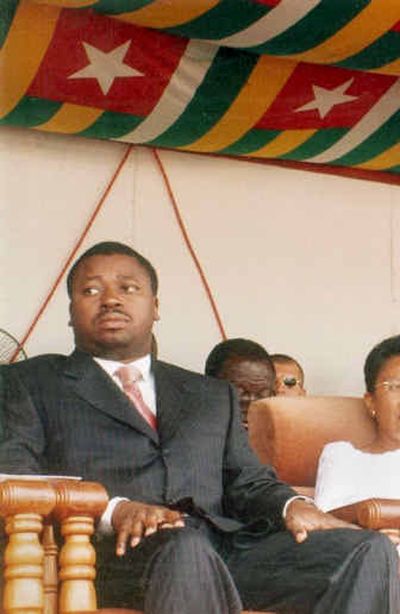Late leader’s son sworn in as president

LOME, Togo – A strike shut down the main market and other businesses in the capital Tuesday, a day after the son of Togo’s longtime leader was sworn in as his successor in a move criticized by other nations as unconstitutional.
The strike was called by opposition parties. On Monday, security forces turned back hundreds of protesting students who had tried to disrupt the swearing-in ceremony of Faure Gnassingbe.
Gnassingbe’s father, President Gnassingbe Eyadema, died of a heart attack Saturday. Hours later, the military installed Gnassingbe, although the constitution stipulates the parliament speaker was next in line for the presidency.
On Sunday, the national assembly approved Gnassingbe as speaker by a vote of 67-14, then voted to change the constitution to allow him to fulfill his father’s term, which expires in 2008.
Opposition to the succession grew abroad, with Britain’s Foreign Office condemning the change of power and the African Union threatening unspecified sanctions, underlining the eagerness of many on this continent to put the old days of dictatorship behind them and embrace democracy.
“Togo is not a hereditary monarchy, so the army and parliament have no right to impose the son of President Eyadema on the people,” welder Emmanuel Akwetey said at his home in Lome. “We have to let them know that we disagree with this, we are protesting.”
Textile merchant Seydou Kone sat outside his store in the capital, saying he would not open for fear of looting, but there were no signs of violence. Most government offices and commercials bank opened as usual.
The protest was remarkable, given Togo’s history of repression under Eyadema, who claimed sole control of the West African nation of 5.5 million in 1967 after taking a leading role in what was sub-Saharan Africa’s first postcolonial military coup four years earlier.
The Peace and Security Council of the 53-nation African Union, which had condemned the army’s appointment of Gnassingbe as a military coup, threatened sanctions if constitutional rule was not quickly restored in Togo.
The council said in a statement late Monday that “the manner through which the de facto Togolese authorities organized the succession in Togo … constitutes a blatant and unacceptable violation of the Togolese constitution.”
The British Foreign Office denounced the events, advising citizens to avoid travel to Togo and urging the country’s authorities “to ensure a peaceful transition process and to arrange for early credible and democratic presidential elections.”
In New York, U.N. Secretary-General Kofi Annan expressed concern the transfer of power did not fully respect the constitution, said U.N. spokesman Fred Eckhard.
French President Jacques Chirac spoke Sunday to African leaders and “made it known that the time of military coups d’etat is finished in Africa,” said his defense minister, Michele Alliot-Marie. The French foreign ministry pressed for the quick organization of free, democratic elections.
Had the army not stepped in, the interim presidency legally would have gone to Fanbare Ouattara Natchaba, the speaker of parliament, who was in Europe when Eyadema died.
Unable to return because authorities sealed Togo’s borders for several days, Natchaba flew to Benin, where he met with President Mathieu Kerekou late Monday, Benin state television reported. Officials there said he was free to return to Togo, but it was unclear whether he had done so.